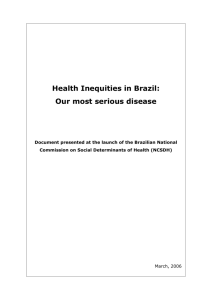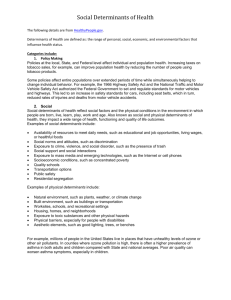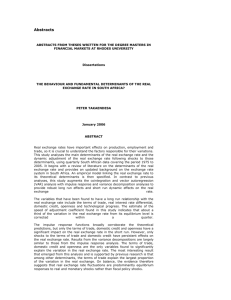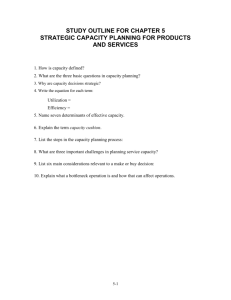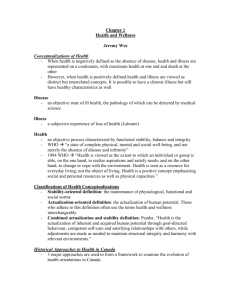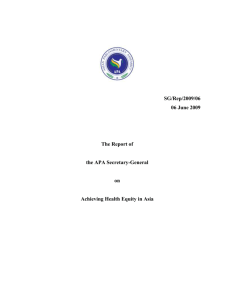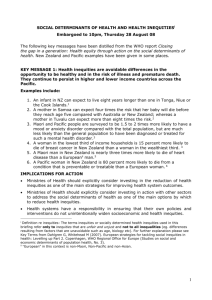Document
advertisement
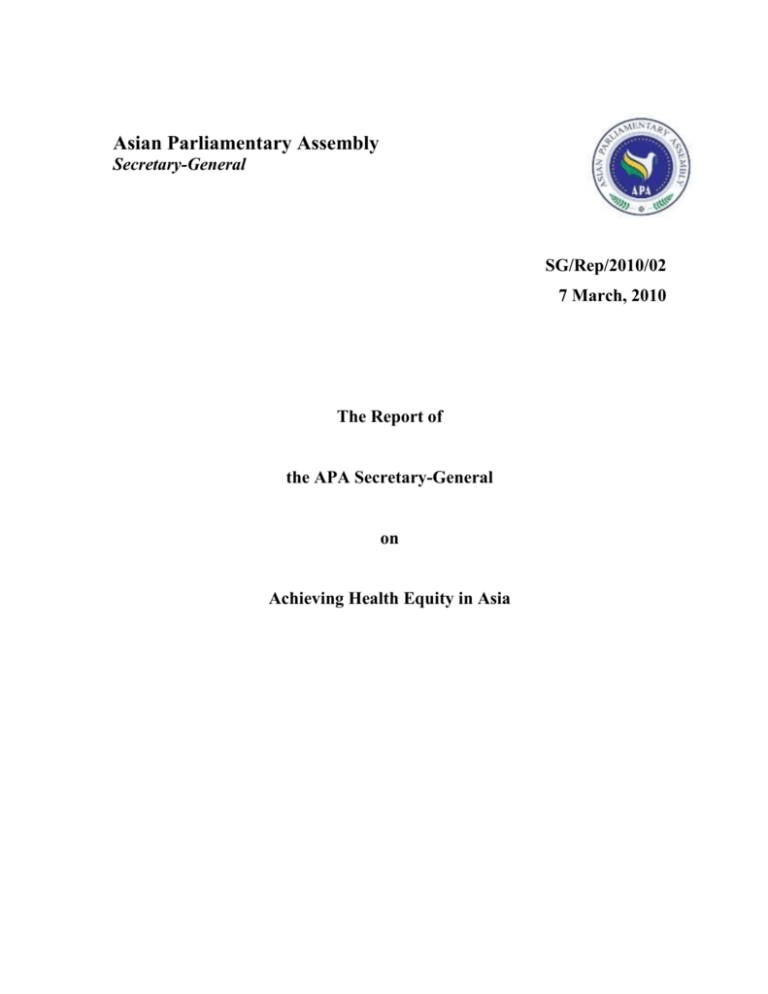
Asian Parliamentary Assembly Secretary-General SG/Rep/2010/02 7 March, 2010 The Report of the APA Secretary-General on Achieving Health Equity in Asia Background: The forth APA plenary met on 7-10 December 2009 in Bandung, Indonesia and adopted the resolution on Achieving Health Equity in Asia. (APA/Res/2009/6) According to this resolution the plenary decided to further study the progress made in implementing the said Resolution by the SubCommittee or the Standing Committee on Social and Cultural Issues. The mandate of the Committee was defined “to identify the main social determinants of health inequities and proper mechanism to remove them by providing relevant recommendations to the Asian Parliamentary Assembly”. By the same resolution, the plenary further requested the Secretary General to prepare a report for consideration of the Committee. Introduction: In light of the above and based on the text of the resolution, the Secretary General submits the present report to the Committee. This report is prepared mainly in accordance with the latest findings of World Health Organization as well as the Report of the Commission on Social Determinant of Health. The report reviews the main social determinants of health in Asia, and focuses on the role of parliaments in promoting policies on health to address the problem of socio- economic inequalities at the global, regional and national levels. The result of the Committee deliberations will be forwarded to the first Executive Council meeting in 2010 to be referred to APA Plenary for further consideration and action. Social determinants of health and health inequality The existing socio-economic inequalities and its negative impact on health of the poor and disadvantaged groups, particularly in the remote geographical area as well as the margins of the big cities in Asia constitute a major source of concern. The social determinants of health have been described as 'the causes of the causes'. They are the social, economic and environmental conditions that influence the health of individuals and populations. They include the conditions of daily life and the structural influences upon them. As WHO has described: -1- “The social determinants of health are the conditions, in which people are born, grow, live, work, and age, including the health system. These circumstances are shaped by the distribution of money, power and resources at global, national and local levels, which are themselves influenced by policy choices. The social determinants of health are mostly responsible for health inequities - the unfair and avoidable differences in health status seen within and between countries.” To tackle such increasing inequities, WHO established the Commission on Social Determinants of Health (CSDH) in 2005 to provide advice on how to reduce them? Its main goal has been to support countries and global health partners to address the social factors leading to ill health and inequities. In order to achieve its goals, the Commission on Social Determinants of Health has focused on: a- Country action to develop policies that address the social causes of poor health and inequities. b- Civil society organizations to provide vital inputs to this goal. c- Knowledge networks to support policy design and action The Commission's final report was launched in August 2008, and contained three overarching recommendations: I. Improve daily living conditions 2. Tackle the inequitable distribution of power, money, and resources 3. Measure and understand the problem and assess the impact of action These recommendations are very effective and mostly applicable to Asian countries, but they need public commitments, coherent policy and an action plan to be implemented. Inequalities in health, both within and between countries, are the result of social differences in economic status, wealth, education, occupation, and place of residence. Thus, it is true to say that the lower the socio-economic position, the worse the health of the people. One may conclude that such inequality is neither just nor fair. -2- Inequities are defined as remediable differences in health status between more and less advantaged groups and geographical areas. To overcome health inequalities in Asia necessitates addressing these systematic disparities in health through action on social determinants of health. Such action is imperative for effective intervention on social determinants of health to reduce inequalities. Thus social approach to health, rather than a pathological one is feasible and proven the most effective in decreasing health inequities. In this regard, policies should be adopted to encourage people’s participation and civil society groups in taking effective measures to reduce inequalities in health. A brief perspective on the range of social determinants that affect people in Asian countries can help to identify major challenges for achieving health equity, and pave the way for advocacy on the part of interested parties, such as parliamentarians, who wish to act on these issues. These social determinants provide a thematic framework for identifying and tackling health inequities. The social determinants are multi-dimensional and interrelated clusters of themes that influence health outcomes, especially inequities in health. Identifying the conditions of daily life resulting in health inequities is a useful guide in priority areas for action. Broadly speaking, the themes identified by the Commission on Social Determinants of Health are similar to those in Asia. These social determinants, rephrased slightly to make them more relevant for Asia, and focusing on conditions that are likely to produce health inequities include: Lack of basic social security coverage, particularly for those who are in precarious work, including informal work and household or care work; Poor conditions for early child development, including child labor and street children; Unfair employment and lack of decent work, insecure employment conditions, especially informal, low wage, with no attention to real and current cost of healthy living; Lack of universal and comprehensive social protection policies; Gender inequity: in employment, and education for girls and women; Unhealthy socially determined lifestyle and behaviors, Armed conflicts and crises resulting in health inequities. -3- Unhealthy environment of expanding urban slums; Inequitable health systems as a barrier to accessing essential health care, In summary, for most countries, especially poorer ones with fewer resources, one can identify social actions affecting maternal and child health as a priority area. Less educated, malnourished mothers living in poor households are more likely to give birth to small babies, who have a slim chance of survival during the first few years of life and/or of life time good health. The household conditions in which these families live – crowding, lack of access to safe water and sanitation, environmental pollution, lack of skills and opportunities for gainful work, and absence of access to health and social services condemn parents and children and coming generations to continued disadvantage. The role of Parliaments The question which must engage parliamentarians, and governments, is how to achieve health equity through action on the social determinants of health. According to the Report of the SDHC as well as WHO findings, the following general policies and action guidelines for achieving health equity are important: To adopt a social approach toward health is rather a change of attitude that requires commitment, advocacy, and legislative action. In this context, health inequality reduction is a shared responsibility and Parliaments are the most proper body to promote this cause. Thus, Asian Parliaments can play a major role in formulating and adopting legislations in order to pave the way for implementation of such social policies. In this way, the proper legislative measures are much needed for promoting social policies on health to address the socio- economic inequalities at the global, regional and national levels in Asia. The role of parliamentarians in providing suitable grounds for achieving health equity in Asia can be categorized under the following areas: Harmonizing approach, the Asian Parliamentary Assembly can play a very significant and specific role in the process of consensus building -4- among Asian Parliaments and adopting a coherent approach in regard with social determinants of health in Asia, Common legislation, APA can take a crucial responsibility in drafting concerted legislation to facilitate and promote health and social equity in practice, such as equitable social protection policies for health care, long term disability, and protection during unemployment and old age, Advocacy, the parliamentarians can be actively involved in supporting and promoting the inclusion of social determinants of health in national policies and programs, Expanding partnerships with academic governmental organizations and the media. institutions, non- Supporting activities of civil society organizations which advocate for disadvantaged groups suffering from health and social inequities, Improving health systems and health financing so that they are more equitable, with resources distributed according to needs, and achieving full coverage, Collecting evidence on social determinants of health and health inequities and successful actions to achieve health equity; including data bases, published and unpublished research papers and reports, and using them for advocacy, Exchanging best practices to achieve health equity including social protection in the form of income support for those who are disabled, ill, elderly or unable to access resources for their basic development needs, -5-

